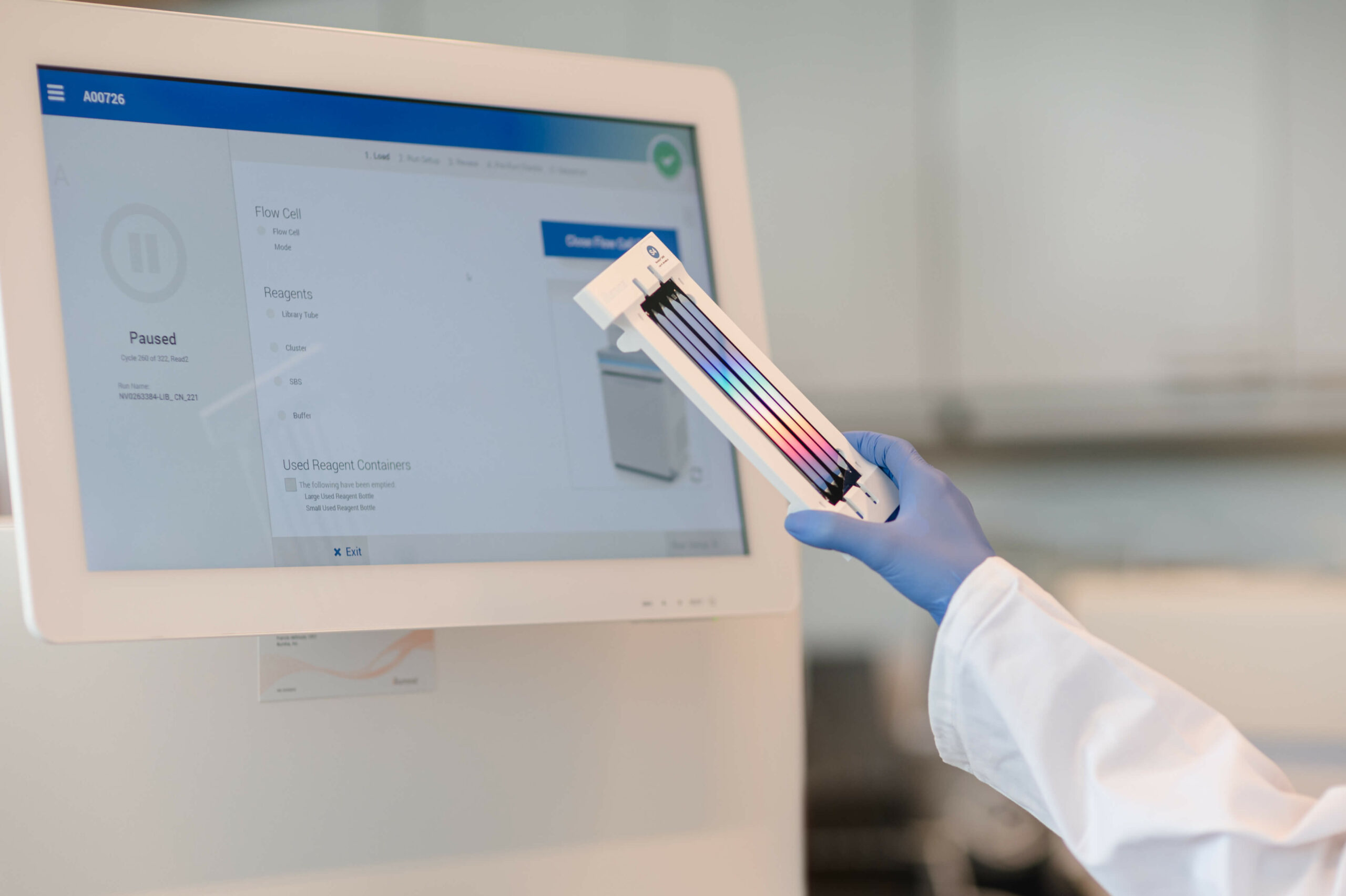OVERVIEW
There are more than 200 hereditary diseases of the connective tissue that can affect the look and growth of skin, bones, joints, heart, blood vessels, lungs, eyes, and ears. Common hereditary connective tissue disorders include: Ehlers-Danlos syndrome (loose joints, easy bruising and stretchy skin), Marfan syndrome (unusually tall and thin with long extremities), Cutis laxa (inelastic, wrinkled skin), Loeys-Dietz-syndrome (scoliosis, loose joints, easy bruising skin) and Osteogenesis imperfecta (easy breaking bones). Most of these disorders are present at birth. Connective tissue diseases can have aortic involvement leading to aneurysms or aneurysm ruptures. Early identification of individuals at risk can help establish the right clinical management plan.
We offer comprehensive and syndrome-specific panels testing for diseases of the connective tissue. The test can offer a molecular genetic diagnosis of a connective tissue disorder that is observed or predicted in you/your child or a family member.

IMPORTANCE OF GETTING TESTED
If you or a family member has a risk of a disease of the connective tissue, identifying the cause can help to take actions to improve the outcome of the disorder. Additionally, family members can be informed and encouraged to also get tested. Our genetic counsellors can provide medical advice.

You have a family history of
connective tissue diseases and want
to know if you are a carrier or
estimate the risk for your child

You/your child has a clinical diagnosis of
a connective tissue disease and
want to confirm/differentiate

You need a prophylactic aortic surgery
and want to determine
the right timing

POSSIBLE OUTCOMES OF THE TEST
A molecular genetic diagnostic report outlining the results of the sequencing analysis is provided. Changes in DNA sequences (variants) can be detrimental and lead to the development of a cardiac or aortic disorder, including asymptomatic disorders that develop later in life. We will report pathogenic and likely pathogenic variants as well as variants of unknown significance.
Pathogenic and likely pathogenic variants mean the genetic cause of the observed symptoms has been identified and may help determine the right treatment and management plan.
Variants of unknown significance means there was not enough evidence to classify the variant as either pathogenic or neutral. Annual variant reclassification and testing family members is recommended.
It is important to note that a negative result does not guarantee the absence of a disorder or that the disorder does not have a genetic cause. Genetic testing is an evolving field and may not detect all variants or there may not currently be enough evidence to classify all variants that lead to an inherited disease.
MEDICAL GENETIC COUNSELLING
We provide expert medical genetic counselling as part of a genetic testing journey. Genetic counselling is a process of communication that supports patients and their relatives before and after genetic testing. It is educational, impartial and nondirective. Prior to any genetic test, genetic counsellors will obtain a detailed family history, explain the method of testing that will be used, its risks and benefits, the limitations of the diagnosis and the implications of making a genetic diagnosis (Elliott and Friedman, 2018, Nat Rev Genet 19:735).
Upon receiving the genetic test results, genetic counselling can help the specialist physician and the patient to interpret them. They can be advised of the consequences of the results including the probability of developing the genetic disorder or passing it on to children, as well as ways to prevent, avoid or reduce these risks (Yang and Kim, 2018, Ann Lab Med 38:291). Our goal of counselling is to provide the patient with greater knowledge and thus, a better understanding of the results and the ability to make a more informed decision.

1 ml EDTA Blood
Please note: DO NOT FREEZE. Ship with a frozen ice pack. Prepare the package such that the tube is tightly packed and not loose. Avoid getting the blood tube wet from the ice pack. Place a paper towel in between ice pack and blood tube if necessary. In sub-zero temperatures, include an unfrozen ice pack in the shipping container as insulation.
15-25 working days
DNA is isolated and next generation sequencing is performed on all coding exons and conserved intronic regions. Single base pair changes, small deletions and duplications and copy number variants (CNV) are identified. Sequencing runs result in a Quality Score of >30 (accuracy >99.9%) in at least 75% of all bases with a coverage of >20-fold. CNV detection sensitivity is 76.99% and precision is 62.59% (with GC limitation between 0.4 and 0.6 per target sensitivity is 77.04% and precision is 84.10%). Variant classification is performed following ACMG guidelines (Richards et al. 2015, Genet Med 17:405; Kearney et al. 2011, Genet Med 13:680).
Next generation
sequencing (Illumina)
Twist Human Core
Exome plus Ref Seq
Spikeln
Illumina DRAGEN
Bio-IT Platform
VarSeq by
GoldenHelix
hg38, NCBI GR38
>30 (precision >99,9%)
in min. 75% of bases
99.92-99.93%; confirmation of reported SNV with Sanger
sequencing, data analysis with
SeqPilot
Richards et al. 2015, Genet Med
17:405; Ellard et al. “ACGS Best
Practice Guidelines for Variant
Classification 2020″
MaxEntScan,
SpliceSiteFinder-like,
REVEL
HGMD Professional
release, ClinVar,
gnomAD
OUR TESTS
Genes: COL2A1
Genes: FGFR3
Genes: FGFR2
Genes: GATA5, NOTCH1, ROBO4, SMAD6
Genes: FBN2
Genes: FGFR1, FGFR2, FGFR3, TCF12, TWIST1
Genes: ALX4, BMP4, CCBE1, CDC45, CEP120, EFNB1, ERF, ESCO2, FGFR1, FGFR2, FGFR3, FREM1, GLI3, IFT122, IFT140, IFT43, IL11RA, IMPAD1, IRX5, KRAS, MEGF8, MSX2, MYH3, P4HB, POR, RAB23, RECQL4, SCARF2, SEC24D, SKI, SMAD6, SPECC1L, STAT3, TCF12, TGFBR1, TGFBR2, TWIST1, WDR19, WDR35, ZIC1
Genes: FGFR2
Genes: FGFR3
Genes: ALDH18A1, ATP6V0A2, ATP6V1A, ATP6V1E1, EFEMP2, ELN, FBLN5, LTBP4, PYCR1
Genes: ADAMTSL4, FBN1, LTBP2
Genes: ADAMTS2, AEBP1, B3GALT6, B4GALT7, C1R, C1S, CHST14, COL12A1, COL1A1, COL1A2, COL3A1, COL5A1, COL5A2, COL6A1, COL6A2, COL6A3, DSE, EMILIN1, FKBP14, FLNA, PHYKPL, PIEZO2, PLOD1, PLOD3, PRDM5, SLC2A10, SLC39A13, TNXB, ZNF469
Genes: COL1A1, COL1A2
Genes: COL1A1, COL1A2, COL3A1, COL5A1, COL5A2
Genes: ADAMTS2, AEBP1, B3GALT6, B4GALT7, CHST14, COL1A2, DSE, FKBP14, PLOD1, SLC39A13, TNXB
Genes: COL1A2
Genes: COL1A1, COL5A1, COL5A2
Genes: AEBP1, TNXB
Genes: ADAMTS2
Genes: FKBP14, PLOD1
Genes: CHST14, DSE
Genes: COL12A1
Genes: C1R, C1S
Genes: C1R, C1S, COL12A1, COL6A1, COL6A2, COL6A3, EMILIN1, FLNA, PHYKPL, PIEZO2, PLOD3, PRDM5, SLC2A10, ZNF469
Genes: B3GALT6, B4GALT7, SLC39A13
Genes: COL3A1
Genes: ADAMTSL2, FBN1, LTBP3
Genes: COL4A1, COL4A2
Genes: COL2A1
Genes: FGFR3
Genes: COL2A1
Genes: SHOX
Genes: SHOX
Genes: SMAD2, SMAD3, TGFB2, TGFB3, TGFBR1, TGFBR2
Genes: MED12, UPF3B, ZDHHC9
Genes: FBN1, TGFBR1, TGFBR2
Genes: ADAMTS10, ADAMTS17, ADAMTSL2, ADAMTSL4, EFEMP1, FBN1, FBN2, LTBP2, LTBP3, MED12, SKI, UPF3B, ZDHHC9
Genes: COL11A1
Genes: BGN
Genes: COL10A1
Genes: ACTA2, CHD2, CNOT3, GUCY1A1, RNF213, SETD5
Genes: FGFR3
Genes: BMP1, COL1A1, COL1A2, CRTAP, FKBP10, IFITM5, P3H1, PLOD2, PPIB, SERPINF1, SERPINH1, SP7, TMEM38B, WNT1
Genes: COL1A1, COL1A2, IFITM5, WNT1
Genes: BMP1, CRTAP, FKBP10, P3H1, PLOD2, PPIB, SERPINF1, SERPINH1, SP7, TMEM38B, WNT1
Genes: COL11A2
Genes: FGFR1, FGFR2
Genes: ABCC6
Genes: DVL1, DVL3, NXN, ROR2, WNT5A
Genes: TWIST1
Genes: DYNC2H1, IFT80, NEK1, TTC21B, WDR34
Genes: CEP120, CSPP1, DYNC2H1, DYNC2LI1, EVC, EVC2, IFT122, IFT140, IFT172, IFT43, IFT52, IFT80, KIAA0586, NEK1, TCTN3, TTC21B, WDR19, WDR34, WDR35, WDR60
Genes: SKI
Genes: COL2A1
Genes: COL11A1, COL11A2, COL2A1, COL9A1, COL9A2
Genes: ACVRL1, ENG, GDF2, SMAD4
Genes: FGFR3
Genes: ACTA2, BGN, CBS, COL1A1, COL3A1, COL4A5, COL5A1, COL5A2, EFEMP2, ELN, EMILIN1, FBLN5, FBN1, FBN2, FLNA, FOXE3, GATA5, LOX, LTBP3, MAT2A, MFAP5, MYH11, MYLK, NOTCH1, PLOD1, PRKG1, ROBO4, SKI, SLC2A10, SMAD2, SMAD3, SMAD4, SMAD6, TGFB2, TGFB3, TGFBR1, TGFBR2
Genes: FBN1
Genes: ADAMTS10, ADAMTS17, FBN1, LTBP2
LATEST ARTICLES





















